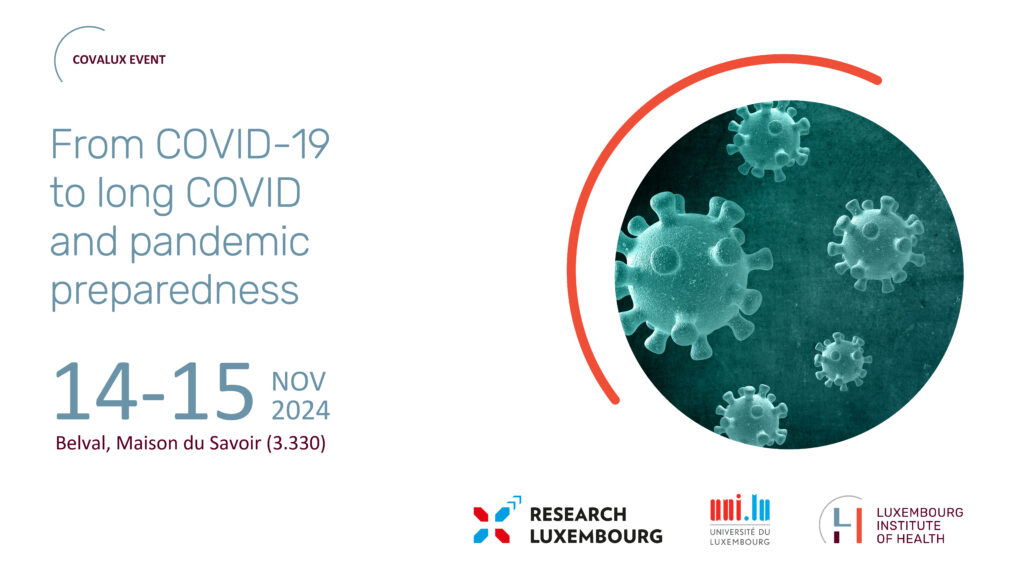News
LIH and Luxembourg hospitals contribute to assessing the safety of potential COVID-19 treatments
- Clinical Research
- Clinical and Epidemiological Investigation Center (CIEC)
- Covid-19 – Infectious Diseases

The “DisCoVeRy” and “Solidarity” clinical trials produce evidence on the effectiveness of novel experimental COVID-19 drugs
The Centre Hospitalier de Luxembourg (CHL), and specifically its National Infectious Disease Department (Service National des Maladies Infectieuses – SNMI) and Intensive Care Unit, the Hôpitaux Robert Schuman (HRS), and the Clinical and Epidemiological Investigation Centre (CIEC) of the Luxembourg Institute of Health (LIH) contributed to the results of the European clinical trial “DisCoVeRy”. Although the findings, which were published in December 2020 in “New England Journal of Medicine”, do not support the use of the investigated drugs for the treatment of more severe forms of COVID-19, they represent a step forward in the understanding of the disease and in ensuring patient safety. These results feed into the broader international trial “Solidarity”, supporting its outcomes.
Study goals and operational aspects
The DisCoVeRy clinical trial was launched in March 2020 under the coordination of the French National Institute of Health and Medical Research (Institut national de la santé et de la recherche médicale – Inserm) and as part of the international “Solidarity” trial led under the auspices of the World Health Organization (WHO). DisCoVeRy aims to evaluate the efficacy and safety of four repurposed drugs — remdesivir, lopinavir/ritonavir, interferon beta and hydroxychloroquine — in hospitalised COVID-19 patients. The molecules were administered in four different combinations in parallel with standard care, and compared to standard care alone as a reference. These treatment options were randomly allocated to the study participants, although both patients and physicians were aware of the modality administered. Participants were assessed after 15 and 29 days, and clinical data, adverse events, nasopharyngeal swabs, lower respiratory tract specimens and other parameters were collected.
Luxembourg’s role
In Luxembourg, the trial is led by Dr Thérèse Staub (CHL), Dr Jean Reuter (CHL), Dr Claude Braun (HRS) and Dr Marc Berna (HRS). The CHL team is responsible for patient recruitment, having recently included 2 new participants, bringing the total number of enrolled Luxembourg patients to 15. LIH’s CIEC played a key role in setting up the study, ensuring the close cooperation with CHL and Inserm, facilitating the obtainment of all necessary regulatory authorisations and supporting CHL physicians on operational aspects and patient follow-ups. Moreover, CIEC is responsible for biological sample collection and logistics, together with CHL and the Laboratoire National de Santé (LNS), and for recording and closely monitoring the collected patient clinical data prior to their transmission to the study coordinator for analysis.
Preliminary results: treatment efficacy
Based on the interim analysis of the data, three of the four treatment combinations – namely the ones entailing hydroxychloroquine, lopinavir, ritonavir and interferon beta– were suspended due to unsatisfactory results by June 2020. Conversely, the remdesivir treatment arm is currently ongoing and actively enrolling participants.
Between March 22nd and June 29th, 603 participants were included from 32 recruitment centres in France and Luxembourg and randomly assigned to the four different treatment options, 583 of whom were evaluable for analysis. Participants were mostly men with a median age of 63 years. The most frequent pre-existing conditions were obesity (166 participants, i.e. 28.7% of the total), chronic cardiac disease (151 participants, 26%) and diabetes mellitus (128 patients, 22%). Moreover, upon enrollment, 211 (36.2%) participants presented a severe disease. In terms of clinical status after 15 and 29 days, the study reported no significant differences between any of the experimental treatment arms and the control arm. Similarly, no significant differences were observed in the proportion of participants displaying a decrease of the SARS-CoV-2 viral load in response to one of the treatments, compared to the control group.
Preliminary results: treatment safety
A total of 579 participants were included in the analysis of the safety of the four experimental treatments. The study showed that 274 participants reported serious adverse events (SAEs), particularly when treated with lopinavir/ritonavir. In particular, the most frequently reported SAEs were acute respiratory failure (in 65 patients, i.e. 11%), acute kidney injury (in 50 patients, i.e. 8.2%), acute respiratory distress syndrome (in 47 subjects, i.e. 8%), arrhythmia (in 41 individuals, i.e. 7%), pulmonary embolism (in 27 participants, i.e. 5%) and sepsis (in 21 patients, i.e. 4%). Moreover, 13% of participants developed at least one kidney-related SAE. A total of 57 fatal SAEs were reported, of which 34 of non-pulmonary origin. Only 4 non-pulmonary-related deaths could be traced back to the experimental drugs.
“Surprisingly, we observed a higher rate of serious adverse effects when lopinavir and ritonavir were administered, particularly renal toxicity, which was unexpected given prior experience with this therapy for the treatment of HIV”, says Dr Guy Berchem, Associated Medical Director at LIH and oncologist at CHL.
“Our study therefore demonstrates that the four experimental treatments did not entail any significant clinical improvements in hospitalised COVID-19 patients, nor were they associated with a reduction in viral loads, leading instead to substantial adverse effects”, says Dr Staub, Head of the SNMI and Principal Investigator of the study.
This is a considerable achievement in terms of ensuring the preservation of patient health, and it will allow us to focus our research efforts on more promising therapeutic options. Moreover, we were able to implement the study and collect and analyse a large amount of data remarkably rapidly and accurately due to the unprecedented mobilisation of the entire international scientific community, which itself is a formidable success
she concludes.
As an add-on trial to Solidarity, DisCoVeRy therefore contributed to the early interruption of ineffective treatment arms through the provision of more detailed data on safety, clinical outcomes and virology. DisCoVeRy has been now extended to other European countries with the support of the European Commission, with the goal of becoming a pan-European platform trial for emerging infectious diseases treatment.
DisCoVeRy is funded by grants from “Programme Hospitalier de Recherche Clinique” (PHRC-20-0351) (Ministry of Health), from the DIM One Health Île-de-France (R20117HD), from REACTing, a French multi-disciplinary collaborative network on emerging infectious diseases, and from the European Regional Development Fund to CHL-LIH (grant agreement 2018-04-026-21).
The interim results of the Solidarity and DisCoVeRy trials were published in December 2020 in the “New England Journal of Medicine” with the full title “Repurposed Antiviral Drugs for Covid-19 — Interim WHO Solidarity Trial Results”.
Scientific Contact









